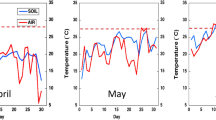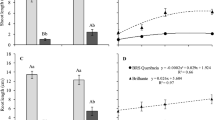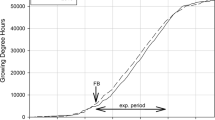Abstract
As a medium for studying the process of bulb formation, the shallot has certain advantages. It is normally grown from sets, and provided a suitable non-flowering strain is chosen any possible confusion between the effects of treatments used on flowering and bulbing is avoided. In our experiments shallot bulbs of two sizes (medium, mean weight 10·59 gm., and small, mean weight 3·12 gm.) were subjected to the following storage treatments during the winter preceding planting : (A) ordinary (laboratory) storage ; (B) low temperature (0–4°) storage ; (C) high (88 days at 30°) followed by ordinary temperature ; (D) low (88 days at 0–4°), followed by ordinary temperature ; (E) ordinary (88 days), followed by low temperature (71 days at 0–4° C).
This is a preview of subscription content, access via your institution
Access options
Subscribe to this journal
Receive 51 print issues and online access
$199.00 per year
only $3.90 per issue
Buy this article
- Purchase on Springer Link
- Instant access to full article PDF
Prices may be subject to local taxes which are calculated during checkout
Similar content being viewed by others
References
Magruder, R., and Allard, H. A., J. Agric. Sci., 54, 719 (1937).
Heath, O. V. S., Ann. App. Biol., 30 (3), 208 (1943).
Heath, O. V. S., Ann. App. Biol., 30 (4), 308 (1943).
Heath, O. V. S., and Holdsworth, M., Nature, 152, 334 (1943).
Heath, O. V. S., and Mathus, B. B., Ann. App. Biol., 31 (3), 173 (1944).
Scully, N. J., Parker, M. W., and Borthwick, H. A., Bot. Gaz., 107, 52 (1943).
Thompson, H. C., and Smith, O., Bull Cornell Agric. Exp. Stat., No. 708 (1938).
Author information
Authors and Affiliations
Rights and permissions
About this article
Cite this article
WARNE, L. Bulb Formation in the Shallot. Nature 161, 935–936 (1948). https://doi.org/10.1038/161935a0
Issue Date:
DOI: https://doi.org/10.1038/161935a0
Comments
By submitting a comment you agree to abide by our Terms and Community Guidelines. If you find something abusive or that does not comply with our terms or guidelines please flag it as inappropriate.



